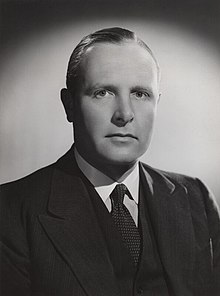Frederick Erroll, 1st Baron Erroll of Hale
The Lord Erroll of Hale | |
|---|---|
 Frederick Erroll, 1945 | |
| Member of the House of Lords | |
| as a hereditary peer 19 December 1964 – 11 November 1999 | |
| Preceded by | Peerage created |
| Succeeded by | Seat abolished |
| as a life peer 16 November 1999 – 14 September 2000 | |
| President of the Board of Trade | |
| In office 9 October 1961 – 20 October 1963 | |
| Prime Minister | Harold Macmillan |
| Preceded by | Reginald Maudling |
| Succeeded by | Edward Heath |
| Member of Parliament for Altrincham and Sale | |
| In office 5 July 1945 – 19 December 1964 | |
| Preceded by | New Constituency |
| Succeeded by | Anthony Barber |
| Personal details | |
| Born | 27 May 1914 London, England |
| Died | 14 September 2000 (aged 86) |
| Spouse |
Elizabeth Barrow (m. 1950) |
Frederick James Erroll, 1st Baron Erroll of Hale, Baron Erroll of Kilmun, TD, PC (27 May 1914 – 14 September 2000) was a British Conservative politician. He was the last surviving non-royal hereditary peer of the first creation.
Background and education
[edit]Erroll was the son of George Murison Bergmans, an engineer, and Kathleen, daughter of George Brodrick Edington, a Glasgow ironmaster. The family changed their German surname to Erroll during the First World War. He was educated at Oundle School and at Trinity College, Cambridge, graduating with a bachelor's degree in mechanical sciences.[1]
Early life and Second World War
[edit]Erroll was an engineer at Metropolitan-Vickers Electrical Co. Ltd, Manchester, 1936–38. He was commissioned into 4th County of London Yeomanry (Sharpshooters), Territorial Army in 1939, and held technical appointments in connection with tank construction and testing (advising SEAC, 1940–43) and served in India and Burma, 1944–45. He left the forces in 1945 with the rank of colonel.[1]
Political career
[edit]Erroll was elected as Member of Parliament for Altrincham and Sale in 1945, holding the seat until 1964. He was Parliamentary Secretary to the Ministry of Supply, 1955–56; Parliamentary Secretary to the Board of Trade, 1956–58; Economic Secretary to the Treasury, 1958–59; Minister of State for Trade, 1959–61; President of the Board of Trade, 1961–63; and Minister of Power, 1963–64. In 1964 he was raised to the peerage as Baron Erroll of Hale, of Kilmun in the County of Argyll.[2] In 1972 he was President of the Electric Vehicle Association of Great Britain.[3] In 1999, aged 85, he was awarded a life peerage as Baron Erroll of Kilmun, of Kilmun in Argyll and Bute,[4] to allow him to sit in the House of Lords following the passing of the House of Lords Act 1999, which excluded hereditary peers.[1]
He was a Member of the House of Lords Select committee on Science and Technology, 1985–91. He held a large number of business appointments.[1]
Personal life
[edit]He married Elizabeth Barrow in 1950. Lord Erroll of Hale died in Kensington and Chelsea aged 86. As they had no children, the hereditary barony became extinct on his death.[1]
  |
|
References
[edit]- ^ a b c d e Roth, Andrew (18 September 2000). "Lord Erroll". The Guardian. Retrieved 5 April 2015.
- ^ "No. 43522". The London Gazette. 22 December 1964. p. 10933.
- ^ "The Battery-Electric Transport Future" (PDF). Contact. 24 (9, September 1972): 183–186. 1972.
- ^ "No. 55672". The London Gazette. 19 November 1999. p. 12349.
- ^ Debrett's Peerage. 1973.
External links
[edit]- 1914 births
- 2000 deaths
- 3rd County of London Yeomanry (Sharpshooters) officers
- Alumni of Trinity College, Cambridge
- British Army personnel of World War II
- Conservative Party (UK) MPs for English constituencies
- Conservative Party (UK) life peers
- Engineers from London
- Members of the Privy Council of the United Kingdom
- Ministers in the Eden government, 1955–1957
- Ministers in the Macmillan and Douglas-Home governments, 1957–1964
- Parliamentary Secretaries to the Board of Trade
- People educated at Oundle School
- Presidents of the Board of Trade
- UK MPs 1945–1950
- UK MPs 1950–1951
- UK MPs 1951–1955
- UK MPs 1955–1959
- UK MPs 1959–1964
- UK MPs 1964–1966
- UK MPs who were granted peerages
- Hereditary barons created by Elizabeth II
- Life peers created by Elizabeth II
- Hereditary peers removed under the House of Lords Act 1999

